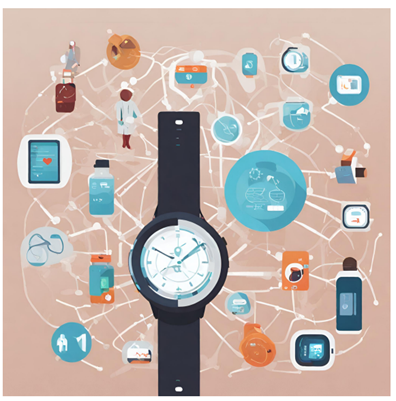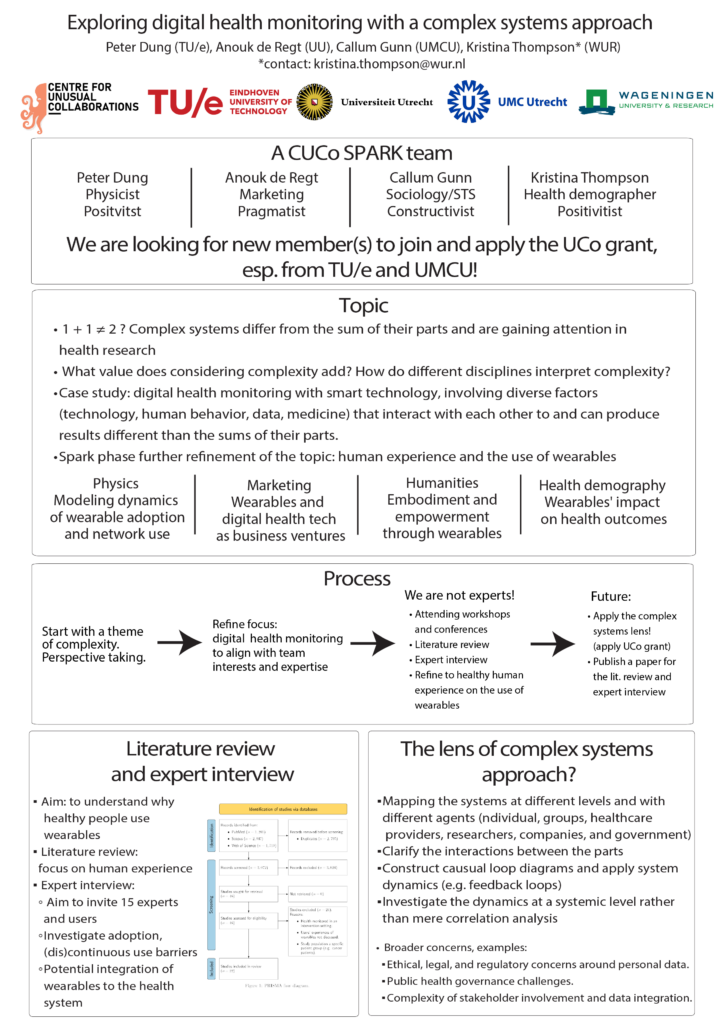What is this project about?
A complex system is different from the mere sum of its parts, and is an increasingly popular concept when studying phenomena in modern health research. But what does considering complexity add beyond buzzwords and blue-sky thinking? And does this concept mean the same thing when applied by different disciplines?
This project will help answer these questions. Researchers from different disciplines – physics, public health, marketing and sociology (now with complexity and education) – will attempt to reach a common understanding of what complex systems approaches can bring to health research.
To do so, we reflexively apply a complex systems lens to a case study, digital health monitoring with smart technology. This involves a host of different factors – technology, human behavior, medicine, data – that interact and can produce results greater than the sums of their parts. We will examine how such a lens can enrich the implementation of these technologies whilst learning more about how complex systems concepts travel across disciplinary boundaries.
For now we are specifically exploring the intersection of wearable technology, health, and human behavior, using a complex systems approach, so to understand why people adopt and maintain/ stop using wearables. For more info, see below!

Recap: Complex Systems and
Wearable Technologies for Health symposium
Team
We are a team of researchers from diverse fields: physics and nonlinear dynamics (Peter, external), marketing (Anouk, UU), health and society (Kristina, WUR), and sociology/science and technology studies (Callum, external). Heleen’s (UMCU) expertise is in complexity and education: she works on innovation and methodologies in education and support others with educational research within the UMCU. Our epistemological traditions range from positivist and pragmatist to constructivist, and our methodological approaches include both qualitative and quantitative methods.
Kristina Thompson (WUR)
kristina.thompson@wur.nl
Project lead
Peter Dung (formerly TU/e, now external)
Anouk de Regt (UU)
Helena Pennings (UMCU)
Process
Spark phase
We initially came up with the theme of complex systems, focusing on how technology, society, and humans interact with each other. Later, we refined this theme to “digital health monitoring,” which better aligns with our backgrounds and interests (see “Topic” below for further elaboration).
Since none of us were experts in this field at the beginning, we are currently conducting a literature review and interviewing experts. We have visited each other and individually and sometimes collectively attended workshops and conferences related to our topic.
From our initial findings during the process of literature review, we found that there is limited complexity science method employed from our search, and the quantitative analysis are mostly statistical correlations between different factors. The study of the dynamics of people adoption using complexity science method, e.g. through social network, is limited. The literature review and the expert interviews served as a ground for the Unusual Collaboration (UCo) phase in which we then employ the complex systems methodology to study why health people use wearables.
Unusual Collaboration (UCo) phase
Literature review and the analysis of the expert interviews are still ongoing.
We are planning to gather experts to co-create a conceptual model for adoption and maintenance of the use of wearables from a symposium (interested in joining? Please register above!).
Topic
How does the theme of “digital health monitoring” relate to our team’s background and interests? For example, the business of wearables and digital technology ties into marketing. The way humans perceive wearables and how these devices empower individuals to understand themselves can be analyzed through an embodiment perspective. The impact of wearables and digital health monitoring on health outcomes is relevant to public health. Additionally, modeling the dynamics of individuals adopting wearables and exploring the potential use of networks is connected to physics.
In the UCo phase (and also the Spark phase), we are focusing on wearables, human experience, and physical activity. However, we are also mindful of other important topics, such as the ethical, legal, and regulatory concerns surrounding personal data and digital power, the governance challenges coupled with public health, and the complexity of involving multiple stakeholders—users, healthcare providers, companies, and governments. We are also aware of the complexity of data and its integration from clinical and biological perspectives. A complex systems approach may offer valuable insights into addressing these issues from a systemic point of view. But we first focus on the user perspective on using wearables for physical health.
As discussed in the Process above, we found that there is limited complexity science method employed from our search in literature review and expert interviews.
Therefore, in the UCo phase, this project addresses this gap by leveraging complexity science to understand how sustainable health behaviour change emerges within systems. We will explore the mechanisms – both individual and system-based – that underpin the diffusion of a health-related technology and its maintenance over time.
Output
Preparing a manuscript
We are currently conducting a literature review and interviewing experts, focusing on wearables, human experience, and physical activity. We aim to publish a paper based on our findings for this Spark phase.
Poster presentation
Together with some other CUCo Spark and UCo teams, the Complexity Team represented by Peter presented a poster on the UMCU Research day 2024 (30 sep 2024). While we did not attract much interests from other audience, we re-connect with other CUCo teams and share experience between each other. The poster is shown below.

A flash talk and a discussion at a complexity science workshop
The team, represented by Peter, attended a complexity science methodology workshop organized by POLDER (“a research initiative led by the Institute for Advanced Study [IAS] at the University of Amsterdam” on complexity science and policy) at IAS on 26 mar 2024. Since the Spark exploration journey is at the early stage, we introduced the team formation, the process, and the topic. We presented the questions that are asked by each of our team members. For example, “what are the barriers and facilitators for the implementation of “wearable smart tech for health”?”, and “how do the users make sense of their health through smart wearables?”
The audience include researchers who employ complexity science methods to tackle health-related problems. During the discussion, we asked the following questions to the audience to gain feedback about our project:
From your own perspective and expertise,
– What interests you in this theme “digital health monitoring” and “complex system approach”?
– What other questions would you ask on this theme?
– If you’d like to investigate this topic, what aspect are you interested in?
– How do you think about our posted questions in the last slide? Do we ask the right questions?
We gained valuable feedbacks and interesting perspectives. E.g. we can look up the use of ecological momentary assessment (EMA) for “repeated sampling of subjects’ current behaviors and experiences in real time” (Shiffman 2008), which aligns with the “system approach” that incorporates the environmental conditions in studying the samples dynamically. We also gain valuable resources on digital health monitoring from some participants too.
Collaboration with another UCo team – Plasticity
On 30-31 May 2024, Peter and Kristina attended an transdisciplinary 2-day event “The Shapeshifters Symposium” organized by the UCo Plasticity team. We were amazed by the fruitfulness of transdisciplinary discussions, and found similarities between these two CUCo teams that we both started from a concept (“plasticity” and “complexity”). Since there are overlaps between the concepts of “complexity” and “plasticity”, a separate discussion between these two concepts was held on Day 2. For example, on Day 1 one speaker Prof. Peter Sloot from UvA made a claim of “complex (adaptive) systems show plasticity”. We are preparing a Whitepaper together with the Plasticity team on exploring the relationship between complexity and plasticity by applying an interdisciplinary angle.
Career steps made possible through CUCo project
One of the team members, Peter, partly thanks to the CUCo Spark training and working through two Spark projects (this team Complexity team and the other IMPAct team), was able to find a research position to work on another transdisciplinary project Rethink Hydrogen, at Utrecht University between 15 aug to 14 dec 2024.